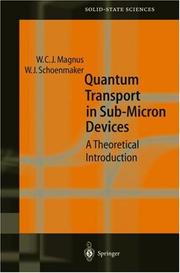| Listing 1 - 6 of 6 |
Sort by
|
Book
ISBN: 1000799409 100333766X 100333766X 1000799263 8793519834 9788793519831 9788793609938 8793609930 9781003337669 9781000799408 9781000799262 8793519842 9788793519848 Year: 2017 Publisher: Aalborg River Publishers
Abstract | Keywords | Export | Availability | Bookmark
 Loading...
Loading...Choose an application
- Reference Manager
- EndNote
- RefWorks (Direct export to RefWorks)
Annotation Computational electrodynamics is a vast research field with a wide variety of tools. In physics, the principle of gauge invariance plays a pivotal role as a guide towards a sensible formulation of the laws of nature as well as for computing the properties of elementary particles using the lattice formulation of gauge theories. However, the gauge principle has played a much less pronounced role in performing computation in classical electrodynamics. In this work, the author demonstrates that starting from the gauge formulation of electrodynamics using the electromagnetic potentials leads to computational tools that can very well compete with the conventional electromagnetic field-based tools. Once accepting the formulation based on gauge fields, the computational code is very transparent due to the mimetic mapping of the electrodynamic variables on the computational grid. Although the illustrations and applications originate from microelectronic engineering, the method has a much larger range of applicability. Therefore this book will be useful to everyone having interest in computational electrodynamics. The volume is organized as follows: In part 1, a detailed introduction and overview is presented of the Maxwell equations as well as the derivation of the current and charge densities in different materials. Semiconductors are responding to electromagnetic fields in a non-linear way, and the induced complications are discussed in detail. Part 2, using the gauge potentials, presents the transition of electrodynamics theory to a formulation that can serve as the gateway to computational code. In part 3, a collection of microelectronic device designs demonstrate the feasibility and success of the methods in Part 2. Part 4 focuses on a set of topical themes that brings the reader to the frontier of research in building the simulation tools, using the gauge principle in computational electrodynamics. Technical topics discussed in the book include:-Electromagnetic Field Equations-Constitutive Relations-Discretization and Numerical Analysis-Finite Element and Finite Volume Methods-Design of Integrated Passive Components.

Abstract | Keywords | Export | Availability | Bookmark
 Loading...
Loading...Choose an application
- Reference Manager
- EndNote
- RefWorks (Direct export to RefWorks)
Electron transport --- Holes (Electron deficiencies) --- Holes (Semiconductors) --- Negative ion vacancy --- Crystals --- Energy-band theory of solids --- Semiconductors --- Excess electrons --- Electrons --- Free electron theory of metals --- Transport theory --- Defects --- Quantum mechanics. Quantumfield theory
Book
ISBN: 9022837645 Year: 1984 Publisher: Place of publication unknown Romen Luchtvaart
Abstract | Keywords | Export | Availability | Bookmark
 Loading...
Loading...Choose an application
- Reference Manager
- EndNote
- RefWorks (Direct export to RefWorks)
Transport engineering --- Air traffic --- history [discipline] --- geschiedenis --- luchtvaart --- Netherlands
Dissertation
Abstract | Keywords | Export | Availability | Bookmark
 Loading...
Loading...Choose an application
- Reference Manager
- EndNote
- RefWorks (Direct export to RefWorks)
Book
ISBN: 3030307263 3030307255 Year: 2019 Publisher: Cham : Springer International Publishing : Imprint: Springer,
Abstract | Keywords | Export | Availability | Bookmark
 Loading...
Loading...Choose an application
- Reference Manager
- EndNote
- RefWorks (Direct export to RefWorks)
Designs in nanoelectronics often lead to challenging simulation problems and include strong feedback couplings. Industry demands provisions for variability in order to guarantee quality and yield. It also requires the incorporation of higher abstraction levels to allow for system simulation in order to shorten the design cycles, while at the same time preserving accuracy. The methods developed here promote a methodology for circuit-and-system-level modelling and simulation based on best practice rules, which are used to deal with coupled electromagnetic field-circuit-heat problems, as well as coupled electro-thermal-stress problems that emerge in nanoelectronic designs. This book covers: (1) advanced monolithic/multirate/co-simulation techniques, which are combined with envelope/wavelet approaches to create efficient and robust simulation techniques for strongly coupled systems that exploit the different dynamics of sub-systems within multiphysics problems, and which allow designers to predict reliability and ageing; (2) new generalized techniques in Uncertainty Quantification (UQ) for coupled problems to include a variability capability such that robust design and optimization, worst case analysis, and yield estimation with tiny failure probabilities are possible (including large deviations like 6-sigma); (3) enhanced sparse, parametric Model Order Reduction techniques with a posteriori error estimation for coupled problems and for UQ to reduce the complexity of the sub-systems while ensuring that the operational and coupling parameters can still be varied and that the reduced models offer higher abstraction levels that can be efficiently simulated. All the new algorithms produced were implemented, transferred and tested by the EDA vendor MAGWEL. Validation was conducted on industrial designs provided by end-users from the semiconductor industry, who shared their feedback, contributed to the measurements, and supplied both material data and process data. In closing, a thorough comparison to measurements on real devices was made in order to demonstrate the algorithms’ industrial applicability.
Mathematical models. --- Mathematical optimization. --- Mathematical Modeling and Industrial Mathematics. --- Continuous Optimization. --- Optimization (Mathematics) --- Optimization techniques --- Optimization theory --- Systems optimization --- Mathematical analysis --- Maxima and minima --- Operations research --- Simulation methods --- System analysis --- Models, Mathematical --- Coupled problems (Complex systems) --- Nanoelectronics --- Mathematics. --- Nanoscale electronics --- Nanoscale molecular electronics --- Electronics --- Nanotechnology --- Coupled field problems (Complex systems) --- Problems, Coupled (Complex systems) --- Dynamics
Book

ISBN: 9783030307264 Year: 2019 Publisher: Cham Springer International Publishing :Imprint: Springer
Abstract | Keywords | Export | Availability | Bookmark
 Loading...
Loading...Choose an application
- Reference Manager
- EndNote
- RefWorks (Direct export to RefWorks)
| Listing 1 - 6 of 6 |
Sort by
|

 Search
Search Feedback
Feedback About UniCat
About UniCat  Help
Help News
News